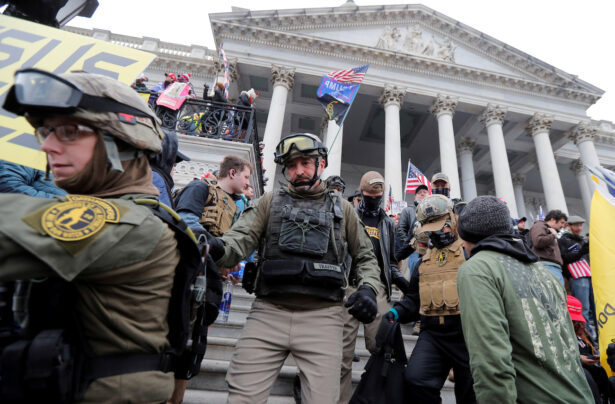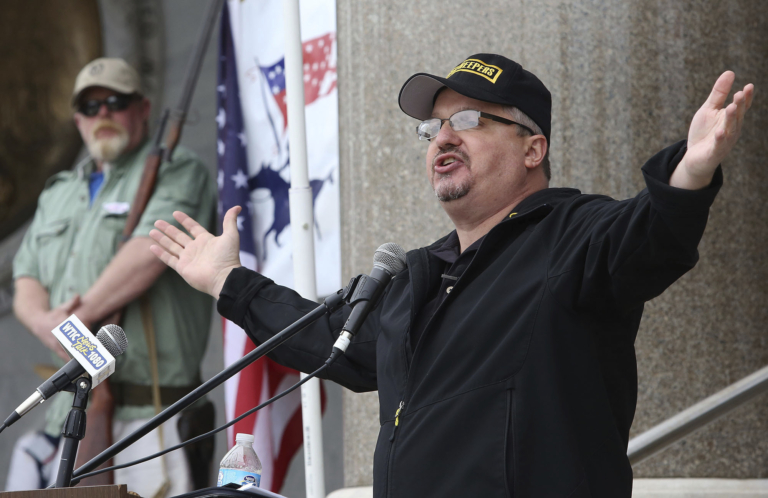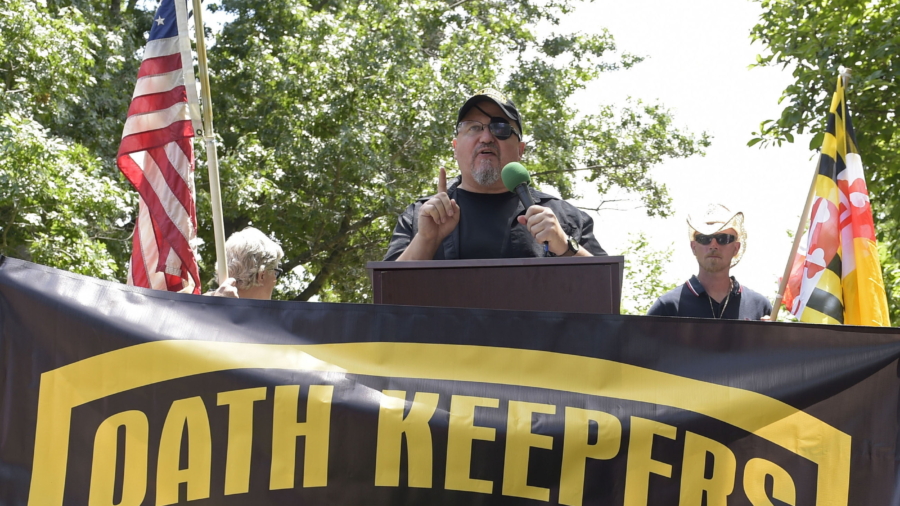The U.S. Department of Justice is seeking a 25-year prison sentence for Oath Keepers founder Elmer Stewart Rhodes III after he was found guilty at trial of seditious conspiracy and other Jan. 6-related charges.
Such a sentence would by far be the longest of any Jan. 6 criminal prosecution.
In a 183-page sentencing memorandum (pdf) filed in U.S. District Court in Washington D.C., the DOJ also recommended prison sentences from 10–21 years for seven other Oath Keepers and an associate found guilty of various Jan. 6 crimes during trials in 2022 and early 2023.
“These defendants were prepared to fight. Not for their country but against it,” federal prosecutors wrote in a filing with U.S. District Judge Amit Mehta.
“In their own words, they were ‘willing to die’ in a ‘guerrilla war’ to achieve their goal of halting the transfer of power after the 2020 Presidential election,” the memo reads. “As a co-conspirator recognized, their actions made these defendants ‘traitors.’”

Other defendants, and the DOJ’s sentence recommendations, include Kelly Meggs, 21 years; Jessica Watkins, 18 years; Roberto Minuta, 17 years; Edward Vallejo, 17 years; Kenneth Harrelson, 15 years; Thomas Caldwell, 14 years; Joseph Hackett, 12 years; and David Moerschel, 10 years.
‘Including Use of Force’
In crafting the recommendations, prosecutors applied enhancers and upward departures from sentencing guidelines for aggravating factors such as obstruction and the role each defendant allegedly played on Jan. 6, 2021.
“As legal challenges to the election sputtered, and President Trump gave no indication that he would invoke the Insurrection Act to halt the certification of the election,” the sentencing memo said, “these defendants explicitly discussed the need to use any means necessary, up to and including the use of force, to oppose the transfer of power, and they began to focus on January 6 as a day of action for their objective.
“Then, on January 6, the defendants seized the opportunity to advance their conspiratorial goal by participating in the attack on the Capitol.”
Prosecutors told jurors in the first two Oath Keepers trials that the group conspired to “prevent the peaceful transfer of power” from President Donald J. Trump to Joseph R. Biden Jr. Defendants seized the opportunity on Jan. 6, 2021, to attack the Capitol and attempt to stymie the ceremonial counting of Electoral College votes from the 2020 presidential election.
Defense attorneys said there was no plan nor a conspiracy to halt certification. They said the Oath Keepers did not “attack” the Capitol, although some members entered the building the afternoon of Jan. 6 and rendered assistance to police. The Oath Keepers were in Washington that day to provide event security and VIP protection for permit-approved rallies, attorneys said.
Didn’t Enter Capitol
Rhodes said he was convicted not for anything he did on Jan. 6, but for who he is and for speech that is protected by the First Amendment.
“I did not enter the Capitol. Nor did I instruct anyone else to enter the Capitol,” Rhodes said in a 46-page reflection written from his jail cell.
“And yet, here I sit, because of who I am, and because of what I said—my political speech—not because of anything constituting an actual crime, not because of anything I actually did,” Rhodes told The Epoch Times.
Rhodes, who will be sentenced on May 25, said he was at a nearby hotel on Jan. 6 when he saw television coverage of violence breaking out at the Capitol. He went to the Capitol and ordered all Oath Keepers away from the building, Rhodes told the FBI in a May 2021 interview.
A jury on Nov. 29, 2022, found Rhodes not guilty of conspiracy to obstruct an official proceeding and conspiracy to prevent a member of Congress from discharging their duty. However, despite not entering the Capitol, Rhodes was found guilty of obstructing an official proceeding.

“So, clearly, the jury found no evidence of any plan by me to do anything regarding entering the Capitol on Jan. 6,” Rhodes said.
In Caldwell’s 25-page sentencing memorandum (pdf), defense attorney David Fischer asked the court to sentence Caldwell to time served with a period of supervised release. Caldwell will be sentenced on May 24.
‘Dubious Claims’
Fischer rapped the DOJ’s “multiple inaccurate, unsupported, and dubious claims” made about his client. He listed 14 such allegations from the trial that ran from Sept. 27 through Nov. 29, 2022.
In the first Oath Keepers charging documents in 2021, Caldwell was made out to be the leader of the alleged Oath Keepers plot to attack the Capitol, Fischer said.
The government “was forced to substantially retract these allegations as it became clear that Caldwell was 1) not a leader of the Oath Keepers; 2) not a member of the Oath Keepers; 3) did not go inside the Capitol on J6; 4) and the pre-planned plot by Caldwell and the Oath Keepers to storm the Capitol with a QRF [quick-reaction force] turned out to be pure fantasy,” according to the claims.
The jury verdict “creates an inconvenient truth,” Fischer asserted, by concluding “that the Oath Keepers organization and its president, Rhodes, did not orchestrate or conspire to engage in illegal conduct aimed specifically at stopping the certification on J6.”
Defense attorney Brad Geyer, who represents Harrelson, said his client was swept into the Capitol by the surge of the crowd on the east steps.
“Kenneth Harrelson attended January 6 to provide security for a protest in the wake of prior events in Washington D.C. that were mired by attacks by and violence from counter-protesters,” Geyer told The Epoch Times. “Although apolitical himself, he supports free expression and the right of others to freely assemble. He had no plan other than to provide security in support of police and protect anyone who needed protection.”
Geyer said “Harrelson can be observed comporting himself peacefully” inside the Capitol At about 1:45 p.m., he and other Oath Keepers bowed down in prayer in the Rotunda. Later they positioned themselves in front of Capitol Police Officer Harry Dunn, who was in a shouting match with protesters, Geyer said.
Harrelson “profoundly regrets entering the Capitol and wishes he had made other decisions on that day,” Geyer said, “but would never engage in violence against police or anyone for that matter and he would most certainly not damage the Capitol or its artifacts that he treasures.”
Sentencing memoranda from the other Oath Keepers defendants had not been filed with the court by press time.
Three groups of Oath Keepers have been tried since September 2022 in U.S. District Court in Washington. All 15 defendants were found guilty of at least some of the charges against them in trials that ended on Nov. 29, Jan. 23, and March 20. Six of the defendants were found guilty of seditious conspiracy.
From The Epoch Times

